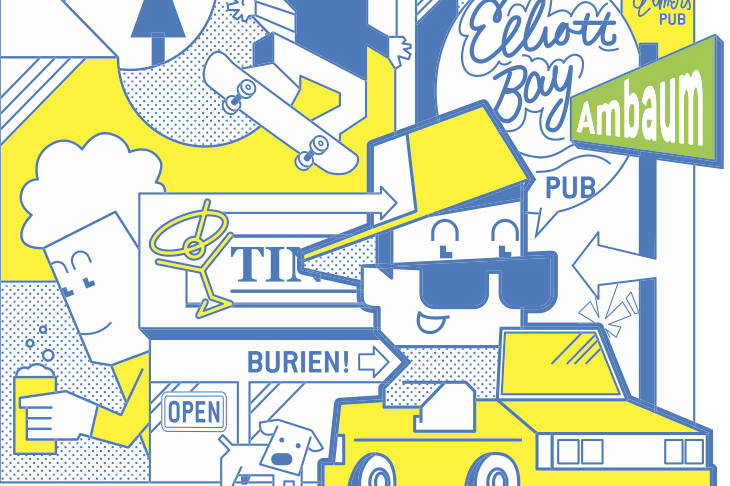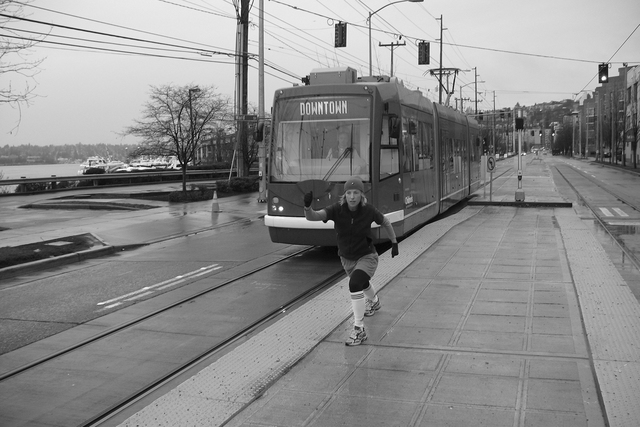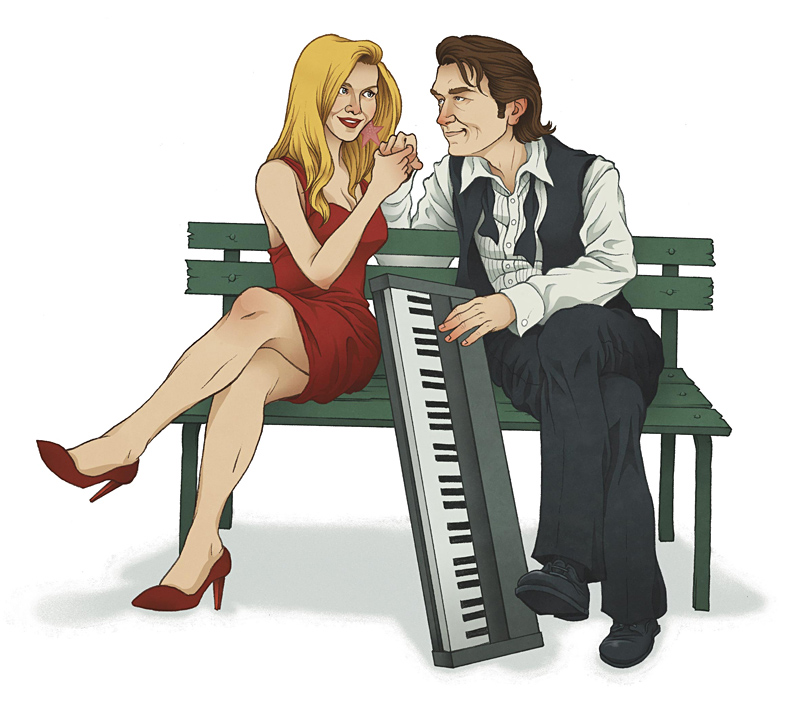Before Johnny Depp penciled on the guyliner and aped Keith Richards in a wildly successful cinematic franchise based on a ride at Disneyland; before the porn industry launched a copycat film that was successful enough to spawn a sequel of its own and win an adult-video-industry award for “Best All-Girl Sex Scene”; and before nightlife impresarios began opening pirate-themed bars specializing in the service of chicken and waffles, there was Das Booty.
Over $5 microbrew pitchers at Anna’s Kaddy Shack (now the Fairhaven Pub) in Bellingham, two Western Washington University students, Matt Millet and Matt Secrest, decided to start a band. They bounced around the names 99 Lonely Asian Jews and Glow in the Dark Senior Puppets before settling on a pun on the Oscar-nominated World War II movie directed by Wolfgang Petersen.
Das Booty’s one and only gig in Bellingham came in 1999, at a Hawaiian-themed house party. In keeping with the theme, they wore Hawaiian print shirts and covered songs like Men at Work’s “Land Down Under” (although it’s unclear what that song has to do with Hawaii). Secrest played lead guitar, Millet was on bass, Dwight Seferos was on keyboards, and Nick Haney played drums—for a while, anyway. Eventually, says Millet, Haney got “so drunk that we just kicked him off the stage.” Other than that, it wasn’t the most memorable of shows.
A year and a half later, the then-popular band Willis (who would rename themselves the Actual Tigers shortly thereafter) was booked to play a show at the Experience Music Project, and was informed that they could tap any local act they wanted to open for them. Rather than invite an established act to play, frontman Tim Seely (my youngest brother) asked the two Matts if they’d be interested in reforming Das Booty—with a significant twist. Seely’s primary objective in picking an opener, says Millet, was “to get as many of his friends into [EMP’s] VIP area as possible.” Hence, Das Booty and the Terrible Men’s Choir, as the act was billed, swelled to more than 20 members, many of whom had never picked up an instrument or sung outside the shower in their lives.
The group quickly settled on a pirate theme, and set about writing a mini–rock opera that spanned half an hour with no breaks. They cut together footage from an assortment of pirate films and projected it onto the massive screen behind the EMP’s stage. Among the shanties sung the night of October 20, 2000, was a number called “He Thought He Was a Pimp,” penned by Willis keyboardist John Low, now a Los Angeles–based composer for PBS’s Frontline. During its performance, a band member named Brad Carlstedt, previously clad in a thick pea coat, stripped down to a black unitard. It was but one hilariously bizarre moment in a night filled with them.
Like the New York hipster who supposedly sparked Puma’s renaissance simply by lacing up a pair on his feet and being a so-called tastemaker, Das Booty’s EMP show sowed the seeds for pirates’ subsequent infiltration of pop culture.
This is not lost on the founding Matts, who go so far as to half-jokingly take credit for the success of Lady Gaga (“We always wore costumes, way before she did,” says Millet) and Miley Cyrus (“Pirates of the Caribbean is Disney, just like Miley,” says Secrest). It also wouldn’t be a stretch to say the group was a forerunner of the choirlike, berobed Polyphonic Spree.
Das Booty was hardly a one-off—or a two-off, if you count the Bellingham gig. A second show at the Crocodile saw them perform a coming-of-age rock opera entitled “Street Light Moon,” a revolutionary concept in that it was the first time anyone had ever seen fit to use the phrase “coming-of-age rock opera” to describe anything. Their third show, again at EMP, was the patriotic “Red White & Booty,” and a fourth show at the Tractor, performed over the holidays, was entitled “Christmas Makes Me Horny.”
Despite these divergent themes, the group always paid homage to its swashbuckling roots by performing its signature song, “Yo Ho Ho,” toward the end of each set. And in true pirate fashion, revenues from these shows were, recalls the band’s resident laptop instrumentalist, Pat Wellnitz (aka C.J. Sob), “donated directly back into the community—in the form of keg parties, which sometimes included taco bars and mariachi bands, and always included excess amounts of liquor. What’s more pirate that that, really?”
The large band continued to play periodically, booking shows to commemorate the passing of each summer and winter solstice at the Tractor. One show included a spirited version of Band Aid’s “Do They Know It’s Christmas?”, and a cover, by a large Greek man named Greg Plumis, of the theme from Cheers became a staple.
But as with many groundbreaking acts, Das Booty eventually began to splinter. Some key members quit over the fact that Secrest committed the act to performing charity and political benefits (one, a fund-raiser for John Kerry’s presidential campaign, was entitled “Booty v. Bush”), claiming that such generosity ran contrary to the group’s hedonistic principles. Others felt that Mooncalf, a side project involving Secrest, Millet, Wellnitz, and Actual Tigers drummer Diarmuid Cullen (who now owns and operates Conor Byrne; Millet and Wellnitz also have stakes in the Ballard Avenue pub), detracted from how seriously those core members took Das Booty. Still others felt that the notion that anybody would take Das Booty seriously—through such previously unheard-of practices as rehearsing for shows—sucked the freewheeling fun out of the endeavor.
Das Booty played its last show on New Year’s Eve 2004 at the Tractor. Post-dissolution, Mooncalf gained momentum, gigging regularly until 2007, when marriage, children, and the general encroachment of adulthood sidelined that act as well. But a comeback may be in the offing: Mooncalf (sans Cullen) will reunite during Artopia in Georgetown, where they will play alongside visual artists Andrew Miller and Ryan Henry Ward, who will be painting live.
Unfortunately, Brad Carlstedt can no longer squeeze his sausage into that black unitard. But he still has the pea coat to prove it.







